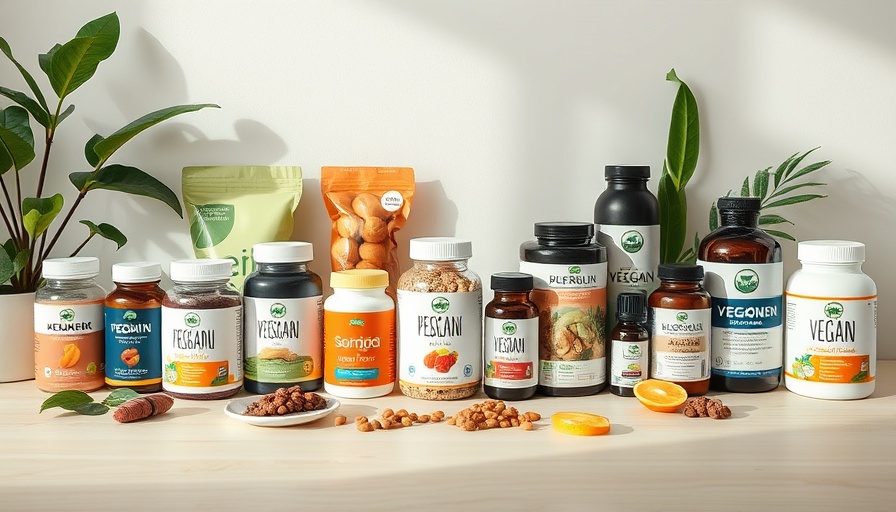
Decoding the Supplement Routine of a Vegan Dietitian
In the quest for optimal health, especially among those following a vegan lifestyle, understanding supplement intake becomes crucial. Jack Norris, a registered dietitian, openly shares his daily supplement routine, which has been tailored to ensure he receives the essential nutrients that a plant-based diet might sometimes lack. This insight not only benefits those who are vegan but also serves as an informative guide for anyone considering dietary changes.
The Foundation: Multivitamins and Minerals
Jack starts his day with a Deva Vegan Multivitamin that provides key nutrients such as 6 µg of vitamin B12, 20 µg (800 IU) of vitamin D2, and 75 µg of iodine in potassium iodide form. B12 is particularly significant for vegans since it is primarily sourced from animal products. Moreover, many vegans might overlook iodine, an essential mineral usually derived from dairy and certain seafood. Jack’s choice to use potassium iodide instead of kelp offers a more consistent and reliable source of iodine without the variability found in sea vegetables.
Zinc: A Closer Look at the Needs
Despite the multivitamin containing 5 mg of zinc, Jack noticed a need for an additional 10 mg tablet. Zinc is essential for immune function, and its deficiency can manifest as cracks at the corners of the mouth, a condition he personally experienced. This highlights an important point: every individual’s nutrient requirements can vary significantly, and it’s crucial to listen to one's body and adjust supplement intake accordingly.
Omega-3s: Hidden in Nature
To meet his omega-3 fatty acid needs, Jack cleverly incorporates about 1/8th cup of chopped walnuts into his diet. While many might think of fish oils as the primary source of omega-3s, it's vital to recognize that plant-based sources like walnuts, flaxseeds, and chia seeds are equally beneficial. They not only promote heart health but also support overall brain function. This is an important reminder that vegans can obtain omega-3s without resorting to animal-based supplements.
Ensuring Calcium Intake
Calcium poses another challenge for those avoiding dairy. Jack tackles this by drinking calcium-fortified orange juice alongside two cups of cooked collard greens most days. His discovery of quick-cooking collards in the microwave also illustrates how convenience can coexist with healthy eating. Additionally, the incorporation of weightlifting into his routine contributes to stronger bones, emphasizing that physical activity plays a significant role in maintaining bone density, regardless of dietary intake.
Vitamin A and High-Protein Choices
Jack’s intake of vitamin A comes from munching on baby carrots with hummus, where the added fats from the hummus enhance the absorption of fat-soluble vitamins. For protein, he opts for diverse sources, including vegan meats and high-protein energy bars. This layering of nutrient-rich foods demonstrates how the combination of diet and supplements can effectively meet the demands of a vegan lifestyle, particularly for those who may have higher protein requirements due to physical activity.
Broadening the Perspective: Why This Matters
Understanding Jack's approach to dietary supplements sheds light on the broader conversation surrounding vegan nutrition. Many people assume that plant-based diets lack all necessary nutrients. However, as Jack demonstrates, a well-planned diet that includes supplements can fulfill nutritional needs and enable individuals to thrive on a vegan lifestyle. Moreover, this knowledge is not just beneficial for vegans; anyone interested in optimizing their nutrition for better health can draw insights from his routine.
Practical Insights for Your Diet
Finding the right supplements and dietary strategies involves personal reflection and adjustments. Here are a few practical tips:
- Monitor your health: Consider regular check-ups that include nutrient level screenings. This can be helpful in identifying which supplements to prioritize.
- Research your options: Look into multivitamins and specific nutrients like B12, omega-3s, and vitamin D.
- Integrate nutrient-dense foods: Incorporate a variety of fruits, vegetables, nuts, seeds, and fortified foods into your meals.
- Balance is key: Combine supplements with physical activity to enhance your overall health outcomes.
Conclusion: Taking Charge of Your Health
By openly discussing his supplement routine, Jack Norris empowers others to make informed choices about their health. As more people explore veganism, it will be crucial to adapt to the unique nutritional challenges that arise. A thorough understanding of one’s dietary needs is essential, and supplementing wisely can play a key role in flourishing on a plant-based diet. Take charge of your health by assessing your dietary choices and considering the addition of specific supplements that may benefit your well-being.
 Add Row
Add Row  Add
Add 




 Add Row
Add Row  Add
Add 

Write A Comment